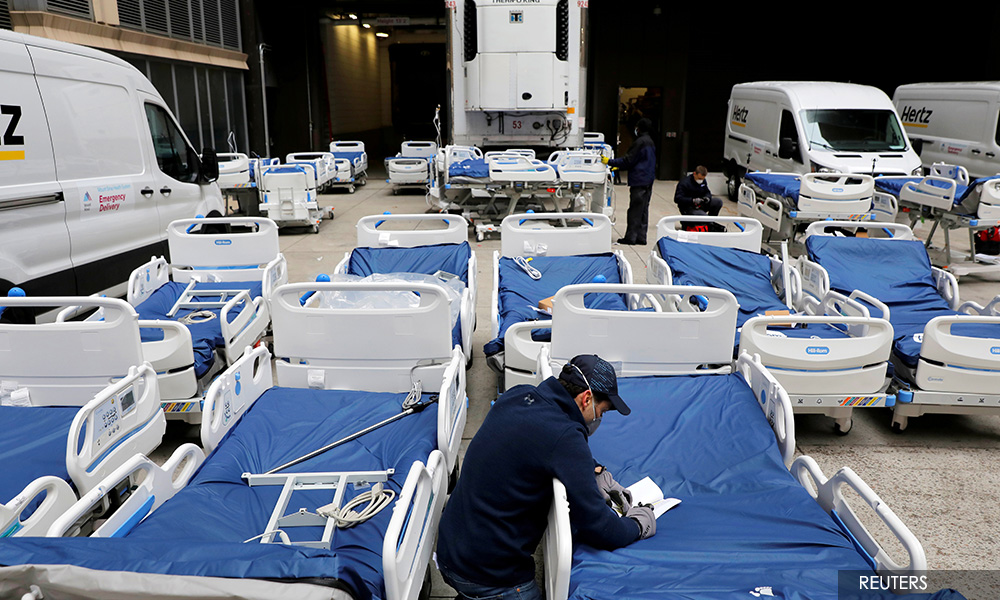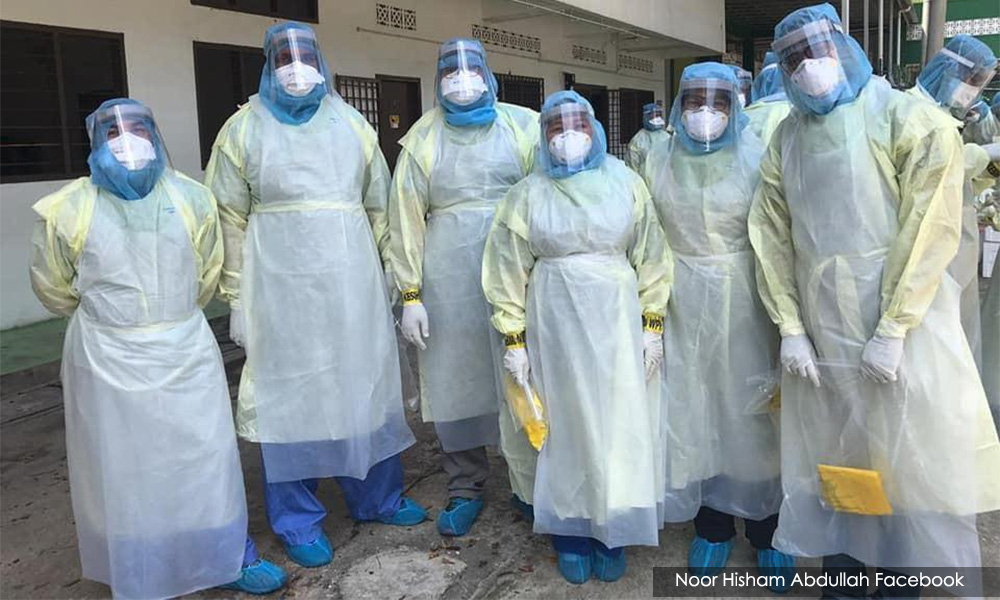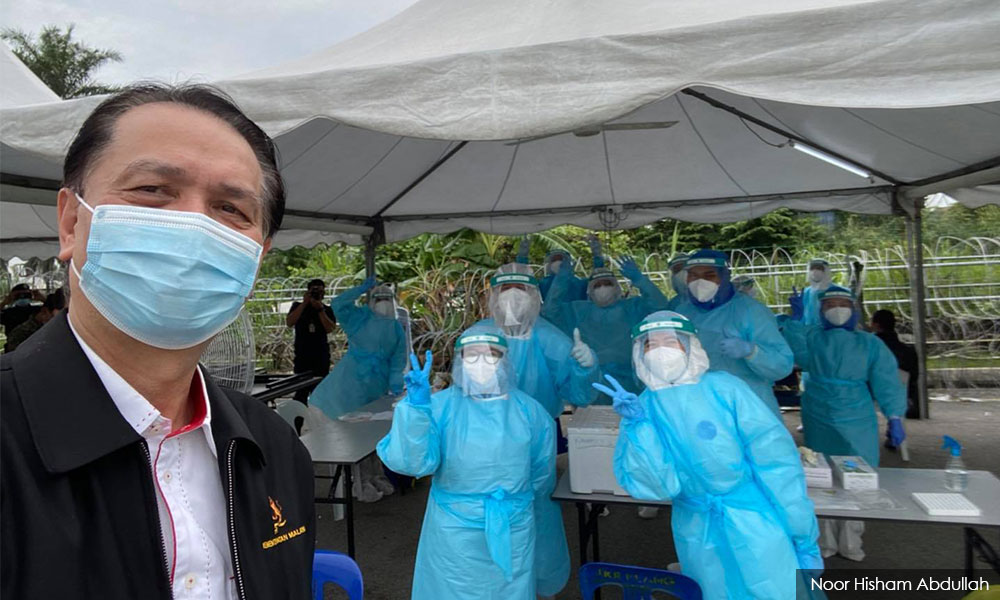The Health Ministry is currently fine-tuning its model to integrate the private sector into the government’s Covid-19 response mechanism.
It is understood that the Health Ministry’s Crisis Preparedness and Response Centre (CPRC) has designed a “conceptual model” that would integrate private clinics, e-hailing service providers, private ambulance providers, industries and private hospitals.
Malaysiakini understands that three of the country's biggest private healthcare providers - IHH Healthcare Bhd, Ramsay Sime Darby Healthcare and KPJ Healthcare Bhd - were briefed by the CPRC on this yesterday.
Nothing is set in stone. Sources told Malaysiakini that private hospitals are scrambling to comply and prepare themselves ahead of another round of discussions with the authorities this weekend.
The model proposed classifying private hospitals into either “Covid-19 hospitals” or “non-Covid hospitals”, similar to what is practised among public hospitals.
Private hospitals will be also tasked with taking care of “special patient groups” including healthcare workers, diplomats and “VIPs”.
In a briefing document sighted by Malaysiakini, the ministry proposed separate strategies for mild and serious cases of Covid-19.

For mild cases - those with no symptoms (Category 1) or mild symptoms (Category 2) - they would be required to perform self-monitoring from home using the MySejahtera app.
Since Jan 12, the ministry has stopped placing patients in these categories in quarantine centres and instead instructed them to self-isolate at home.
Should their conditions worsen, they will be taken to hospital in an ambulance operated either by the government, private firms or NGOs.
An illustration for the model also used the logo of a prominent e-hailing company which could be part of the patient-transfer logistics chain.
It did not detail what kind of standard operating procedures (SOPs) would be involved or who would pay for the trips. Malaysiakini has reached out to that company for comments.
All coordination for mild Covid-19 cases will be performed by the ministry’s Covid-19 Assessment Centre.
Divide and conquer
Serious Covid-19 cases - those with more serious symptoms (Category 3), pneumonia and requiring oxygen (Category 4) and critical illness with multi-organ failure (Category 5) - will be treated in either quarantine centres, public hospitals or private hospitals.
According to the Jan 14 document, the ministry proposed classifying private hospitals as either “Covid-19 hospitals” or “non-Covid hospitals”.
For private Covid-19 hospitals, they will be further grouped into one of these three categories:
- Private Covid-19 hospitals that treat patients with mild symptoms;
- Private Covid-19 hospitals that treat serious or critical patients who need ICU beds; and
- Private Covid-19 hospitals that treat all categories.
Either way, they will be required to continue treating Covid-19 patients for as long as they need care. This could mean private hospitals may not be allowed to refer or transfer patients to public hospitals.
Private hospitals will also be required to admit new Covid-19 patients “especially patients in Category 3” (patients with more serious symptoms).
For private non-Covid hospitals, the government proposed they take on public hospital patients.
These include:
- Emergency patients referred to them by public Covid-19 hospitals;
- Patients in need of elective surgery, especially semi-emergency and cancer-related surgery; and
- Patients who need elective medical procedures, especially for semi-emergencies.
The private non-Covid hospitals will also be required to take on “a portion” of outpatients seen by specialists at public hospitals.

Aside from sharing facilities, the ministry proposed that private hospitals allow some specialist nurses to be placed in public hospitals. Other private hospital staff will also be trained and mobilised to help with Covid-19 relief efforts.
Earlier today, Malaysiakini reported that the ministry has begun negotiations with the Association of Private Hospitals Malaysia (APHM).
Among the proposals was for private hospitals to allocate 10 percent of their normal and intensive care beds for Covid-19 patients.
Some of the payment options discussed are to compel insurance companies to cover patients with medical cards or have Covid-19 patients foot their own bill if they are treated in private hospitals.
Should the pandemic worsen and public hospitals be compelled to refer patients to private hospitals, the Finance Ministry could be roped in to design a mechanism to help those without the means to pay private healthcare bills.
Unified Command Centre
Another feature of the integration plan is to keep government Covid-19 quarantine and low-risk treatment centres (PKRC) open.
The ministry also proposed that industries set up their own PKRCs. No details were described in the briefing documents but the authorities are currently compelling employers to set up their own quarantine centres for low-risk Covid-19 positive workers.
Health director-general Dr Noor Hisham Abdullah previously proposed that existing PKRCs be used to quarantine migrant workers whose living quarters were unsuitable for self-isolation.
All facilities in the model - be they PKRC, private hospitals or public hospitals - will come under the purview of the ministry’s “Unified Command Centre”.
This command centre will determine and arrange what kind of resources each locality needs.
These resources include the type and scope of clinical services, human resources, ambulance services and clinical support services needed.
The command centre will also work with employers in the area to set up industry-based PKRCs.
Both the ministry’s coordination centres - the Covid-19 Assessment Centre (for mild cases) and Unified Command Centre (for serious cases) - will be expected to work together.
The state of affairs
Under the Emergency (Essential Powers) Ordinance 2021, the executive is now able to temporarily seize any land, buildings or assets from Jan 11 for as long as the emergency is in force.
It can also temporarily seize any resources - including human resources, facilities, utilities and assets - that it deems necessary.
Those who do not comply with the temporary seizure of assets and resources will be liable to a RM5 million fine, or 10 years' jail, or both.

Last week, Noor Hisham warned that the public healthcare system was at “breaking point” under the mounting weight of Covid-19 cases.
Meanwhile, it is understood that the three major private healthcare companies were also briefed that Covid-19 beds and intensive care beds were running out in many public hospitals.
They were also informed of the dire projection for Covid-19 deaths in January.
At the time of the briefing, the ministry had close to 2,000 personnel who were out of action either due to Covid-19 infections or in quarantine after being identified as close contacts. - Mkini




No comments:
Post a Comment
Note: Only a member of this blog may post a comment.